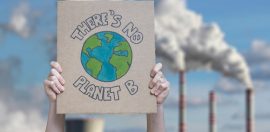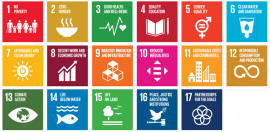Calls for collective action on SDGs to avoid legacy of inequality

14 March 2018 at 5:32 pm
Australia’s leading advocates for sustainable development have called for collective action on the Sustainable Development Goals (SDGs) to avoid a legacy of inequality and environmental degradation for the next generation of Australians.
Around 300 sector leaders from across government, business, academia and civil society came together on Tuesday as part of a high-level national summit to advance implementation of the goals in Australia.
The forum examined Australia’s performance on the SDGs, taking stock of national progress on their implementation across all sectors, mapping priority areas for cooperation as well as steps to achieving the goals.
Co-chair of the summit and Monash University Professor John Thwaites, said sustainable development required everyone to make an effort.
“Sustainable development doesn’t just ‘happen’ or is the responsibility of someone else, somewhere else. It requires everyone to make a global effort and Australia needs to play its part,” Thwaites said.
“We will be leaving the next generation our problems unless we address the SDGs – uncertain jobs, unaffordable housing and a degraded environment.”
He told Pro Bono News that Australia was not on track to meets its targets.
“We’re on track for about a third of the targets but we’ve got a long way to go on a lot of others,” he said.
“In general Australia has a very strong economy and has had a record period of economic growth, generally we’re a very healthy society and well-educated, but we still have high levels of inequality, some real pockets of poverty, and we’re nowhere near meeting most of the environment goals.
“By world standards, we’re very strong on economy, probably a silver medal on the social but we’re coming in towards the bottom of the field on the environment. Particularly, our carbon emissions are the highest per head in the OECD, and there is no way we’re going to meet the targets that we have for reducing carbon emissions and tackling climate change unless we change course.”
Thwaites called for Australia to “decouple economic growth from environmental degradation” in order to meet the 2030 SDG targets.
“We’ve seen signs that you can uncouple economic growth from environmental degradation, for example we’re using a lot less water now in irrigation and in cities and yet we’re still producing more and more product,” he said.
“The way you consume and produce goods needs to change, we need to move towards a low eco footprint, a low material footprint, we need to reuse and have a circular economy. We need to be much smarter and more innovative about the way we do our business. The old ways of doing things which just chewed up resources and spat out waste has to be something from the past.”
He said the Australian SDGs Summit 2018, which builds on the inaugural summit held in 2016, was an opportunity to share innovative practice from across Australia and build the partnerships needed to fulfil the SDGs.
“The SDGs provide the framework for collective action to tackle our biggest challenges which no single sector can address alone, like climate change, inequality and sustainable growth,” he said.
The second national summit comes ahead of Australia’s first Voluntary National Review on the SDGs which will be delivered to the UN in July and a Senate inquiry on the SDGs which will report in November.
Co-chair of the summit, Sam Mostyn, said the Voluntary National Review and the Senate inquiry were catalysts for accelerating Australia’s implementation of the SDGs.
“They provide the chance to review our progress, look at our successes and failures and raise public awareness of the SDGs,” Mostyn said.
“This summit will lift the level of debate on Australia’s SDG performance and identify collective priorities where we can go beyond ‘business as usual’. It’s a great opportunity to coordinate action on the SDGs within government with the actions in business and the broader community.”
Thwaites said there were lots of opportunities to accelerate action in Australia.
“In business we need to be more innovative, we need to collaborate more, we need to ensure that the skills that are needed are shared in all sectors of society and we’re not losing people,” he said.
“Unfortunately some people are falling through the cracks in our education system and we have to make sure that we have all those people skilled and educated people if we are going to have the jobs of the future.
“In the social areas, we do have to make a much greater effort to address inequality and issues like housing affordability. Our housing prices are going up much faster than our wages and people in households are getting more and more in debt and that’s not sustainable. We’re in for a real shock if interest rates rise and the next generation won’t be able to afford housing. So we have a real challenge there.
“In the environment, we have to transform our energy system, our transport system and what we do on the land to meet our targets for tackling climate change. We’re just really not doing anywhere near enough. And the track we’re on now is going to mean more droughts, more bushfires and places like the Great Barrier Reef will be lost.”
Both Thwaites and Mostyn highlighted inequality as an area of concern.
ACOSS CEO Cassandra Goldie, who took part in a panel discussion during the summit and talked about the key principle of “leave no one behind”, raised the need for establishing a national benchmark against which to measure poverty.
She said although the Australian government had endorsed the SDGs, it had refused to take one of the first required steps of implementation.
“The lack of focus on a poverty measure and exclusion of poverty impact analyses in government policy-making has contributed to an increase in poverty in Australia over the past 10 years,” Goldie said.
“We have more than 3 million people living in poverty in Australia, in a population of just 24 million.
“If we are to meet our SDG commitment and cut poverty in half by 2030, we must lift the incomes of the bottom 40 per cent of Australia’s population.”
She said she encouraged greater collaboration between the sector but she cautioned that the different stakeholders had to be prepared to have “really difficult discussions”.
“I don’t want us to allow the SDG agenda to become a comfortable place for us to gather and for us to not be prepared to have the really difficult discussions and the tensions in the policy environment between our governments, the business community and civil society,” she said.
Minister for International Development and the Pacific Senator Concetta Fierravanti-Wells, who gave the keynote address at the summit, said collective action was needed to ensure the SDGs became commonly known in all of our Australian households.
She said the SDGs were a reflection of Australia’s values and ambitions and described them as “the contemporary manifestation of the fair go”.
“The summit is part of a collective national approach to making sure that we are doing all that we can to implement Australia’s commitments under the Sustainable Development Goals,” Fierravanti-Wells said.
“In this room today, we all understand the what, the why and the benefit of the SDGs. It is about ensuring regional stability, security and prosperity.
“Our challenge is to bring the Australian public with us.”
Thwaites said the wider public were already on the journey.
“They don’t know a lot about the goals but they do know about the importance of good health and a good environment,” he said.
“So partly we have to use the expertise and skills in the wider community to start changing the way we do things.”
He said to foster further collaboration Australia had to change its mindset.
“Australian business traditionally hasn’t been very good at collaboration. We, as a country, could do a lot more,” Thwaites said.
“We also need to set goals that we all agree with and then work out a plan to get there. Already we’ve heard today there is some considerable hesitation to have long term plans, well plans are how you get to the place you want to get to. There’s nothing wrong with them as long as you follow through with them.
“So I think we do need more effort at setting a common target and then working out what we need to do to get there and making sure we do that.”
He said it was possible for Australia to get back on track to meet the targets.
“But we need to transform what we’re doing,” he said.
“We need to accelerate our action. To date we’re tending to just cherry pick areas where we’re doing well and highlighting them, we’re not sufficiently highlighting the gaps and taking actions to ensure we’re going to meet the goals.”
The summit was co-hosted by the Australian Council for International Development, the Australian Council of Social Service, the Global Compact Network Australia, SDSN Australia/Pacific and the United Nations Association of Australia.








